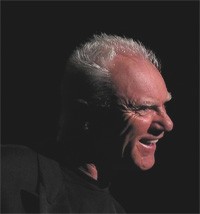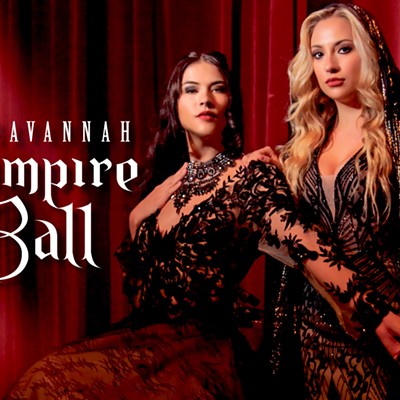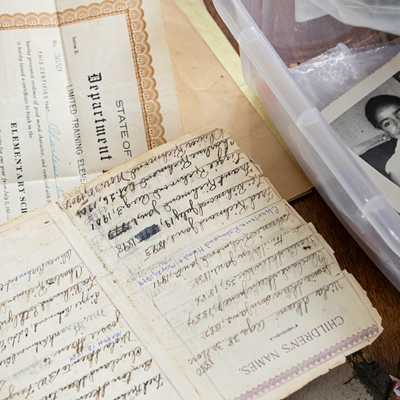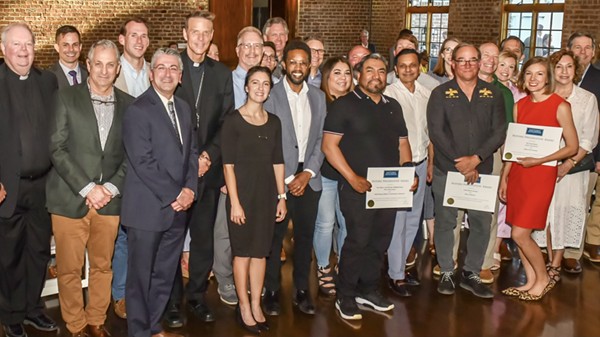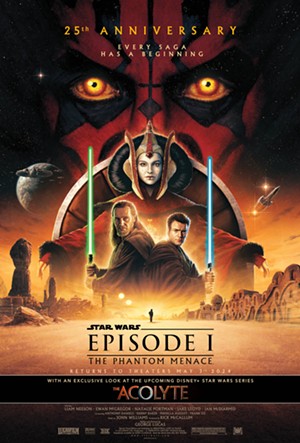ONE OF THE FINEST AND MOST NUANCED film actors of our time, since his screen debut in the 1969 British film If..., Malcolm McDowell has amassed an unusually prodigious body of work.
Known best to casual moviegoers as either the iconic thug Alex in Stanley Kubrick’s landmark 1971 futuristic satire A Clockwork Orange, or as mad scientist Dr. Tolian Soran (the guy who killed Captain Kirk) in 1994’s Star Trek Generations, over the course of his career he has appeared in over 150 different films and TV shows.
From brooding roles in such atmospheric horror and sci-fi flicks as Paul Schrader’s 1982 remake of Cat People and Rob Zombie’s remake of John Carpenter’s Halloween to recurring stints in acclaimed episodic fare like Heroes and HBO’s Entourage, McDowell has shown tremendous range and empathy in his dramatic and comedic choices.
His latest independent project, never Apologize, is a cinematic adaptation of a one-man stage show he wrote and performed as a loving tribute to the late director Lindsay Anderson — who gave him some of his first starring roles (as the iconic British everyman character Mick Travis) in the aforementioned If... and O Lucky Man!.
An acolyte of legendary American director John Ford, Anderson is regarded as transformative figure in England’s Free Cinema and New Wave film movements, yet his influence and legacy have not been widely celebrated outside of his native Britain. McDowell seeks to rectify that through this touching and fond remembrance.
He’ll take questions from the audience at rare screenings of both that recently completed film and the classic A Clockwork Orange at the 11th Annual Savannah Film Festival, where he’ll also receive a Lifetime Achievement Award for his work in the industry.
I spoke at length with McDowell about his respect for Anderson, his own career and his general lack of interest in attending events of this sort (and why he made an exception for Savannah). Highlights of our conversation are below. For a complete transcript, go to connectsavannah.com.
Never Apologize documents a one-man show you created, which itself centers around the film industry. Was that cinematic translation difficult to make?
Malcolm McDowell: You know, strangely enough, it wasn’t. Of course all the stories and stuff were mine, but I had a wonderful collaborator named Mike Kaplan, who edited and found all the material to put into the show. In a weird way it sounds like it could be very boring, but I get to play about 39 different people. I mimic them — and some of them not well at all! (laughs) Over the course of the film I do Lillian Gish, John Gielgud, everybody. I do them all. I just try to embody them without even thinking too much about it. I’m not really a mimic, per se. I don’t study it. I just threw myself into the moment and did it. My goal was merely to embody the person, just channel them rather than some perfectly matched impersonation. It’s all part of the rich tapestry of this story that I’m conveying.
Did this show have a long run on stage before you filmed it, so you could really hone the pacing and learn how it played best to a crowd?
Malcolm McDowell: No! I literally only did five performances, and the film is taken from just one single performance.
Was this in front of an audience, or just for the cameras?
Malcolm McDowell: It was in front of an audience. I think it was about a 500-seater, and I did it as a benefit. I didn’t even know there would be cameras there. I was playing golf and my poor collaborator Mike was trying to get me to rehearse. I said, “I’m playing golf!” (laughs) “You get on with it. You know where the lights go and what music to use.” So, I wander into the theater and saw the cameras and said what’s this? It turns out there was a guy who had a little video production company that was just starting out, and he wanted to use my show as a training ground for his camera crew. They had five cameras there, and I was completely unprepared for that.
Were you pleased with the footage?
Malcolm McDowell: Yes, I was pleased. Because when you’re doing something and reminiscing or telling stories, you’re in the middle of it. You can’t see the wood for the trees. Now, reliving the show is a whole different thing. I hate watching myself and do it as little as I have to. I think it came out very well. Mike did a great job of finding shots and footage and things like that to add in, which can be very time consuming. He’s been a friend of mine since Clockwork Orange, so it was great that we came together again on this particular journey.
Having only read brief descriptions of the movie, I can’t help but imagine it as something akin to one of Spalding Gray’s filmed monologues, in which there are occasional inserts of archival —or specially shot— footage which advances the story along.
Malcolm McDowell: It is a bit like that, yes. It’s very different material, of course. And I wanted to do this show, Never Apologize, because I felt that the new generation of people coming up had no idea about who this man was, or how great a director he was and how influential he’d been on British film. Also on American film as well! I mean, Taps was completely copied shot-by-shot from If.... Of course, that’s fine, and one hopes that their work will influence people. I just was so amazed that Paramount wouldn’t even put that out on DVD. I called them up and they said, “Who cares?” I said now look, how many films does Paramount have that won Cannes?
I don’t know, but I would think few, if any.
Malcolm McDowell: Of course not. I mean, it won the Palme d’Or (Ed. note: then known as the Grand Prix)! It was one of the great films of the period. Marty Scorsese loves it, and I know that because I met him when he came to England with Mean Streets and we went out and had dinner and he raved about it. Then I tried to get Warners to do O Lucky Man!. Same thing! They didn’t want to put it out. Then I got a call from the director of the Edinburgh Film Fest and he asked if I’d come the next year to be a guest for a retrospective of Lindsay’s work — which would also serve as a retrospective of my own early work. I thought, I’ll do one better than that. I’ll do an original show! I felt a bit like Mickey Rooney, you know: “Let’s get a show together!” (laughs)
---------------------------- Tthe official trailer for Never Apologize: ----------------------------Do you often accept invitations to come receive awards or adulation at film festivals like this one?
Malcolm McDowell: No, I don’t actually. You have to be very careful, because I do get invited to take part in things like this a lot and I know it’s only because I’m not horizontal. (laughs) I’m a man that has a big CV of work. I mean, it goes on for pages and pages. I think I’m a survivor and a working actor. Listen, it’s very nice, but I feel that I never look back. People ask me “What’s your favorite part,” and I say “The next one.” I’m not interested in dwelling in the past. I still feel I have some great work ahead of me.
So, with that in mind, why accept the invitation to come to the Savannah Film Fest?
Malcolm McDowell: Well, I got a call from Bobby Zarem.
He’s something of the “magic man” for this festival. I think on some level everyone involved must dread the day when his they can no longer rely on his rolodex. (laughs)
Malcolm McDowell: (Laughs) He is a magic man, indeed. He saw Never Apologize in New York at the Lincoln Center a couple of months ago and just flipped for it. I have a dear friend named Bonnie Timmermann and we’re hoping to do a film together. She’s also a casting director and producer in N.Y. and she said Malcolm, you should go down and do this. Also, I hear the students down in Savannah are really fab and the whole thing down there is very well thought of. So, I like to do stuff for young people. If I can pass on anything to them, I’m happy to do it.
Will you have a chance to stick around and take in a good bit of the festival, or do you have to split right away?
Malcolm McDowell: I can stay for just a little while, but not too much. I do have to get back.
Have you ever been to Savannah before?
Malcolm McDowell: I have. I was in Charleston and came down for the day. I’ve never stayed the night. But we came to look at the beautiful city. We checked it out a bit, had lunch and then went back. Listen, Savannah is not too shabby a town to be invited to! (laughs)
I wanted to ask you a few things about some of your past films.
Malcolm McDowell: Certainly.
One of my favorites has to be Time After Time, which you did with David Warner. Do you care for that film?
Malcolm McDowell: Listen, I’m extremely fond of Time After Time — because I feel in love with Mary Steenburgen on that film. We had two children, and a life together. We divorced eventually, but we’re still great friends. It’s a wonderful film, but I’m especially fond of it because our two wonderful children came out of it, as it were. Being in San Francisco and falling in love — it was really a magical time. A beautiful time. The film is terrific and I think David Warner was absolutely brilliant as Jack The Ripper. Just fabulous.
Another picture that I adore, but which I can never seem to find anyone else who’s particularly familiar with, is one you did in the early ‘80s called Get Crazy, where you play a hedonistic rock star.
Malcolm McDowell: Oh God! How weird that you’d mention that! (laughs) Strangely enough, Allan Arkush, the writer and director of Get Crazy, also did Rock & Roll High School. Now —and this is an example of the weird ways of this business— I now work with him on Heroes. He’s the executive producer of Heroes, and has directed a few episodes as well. Anyway, he and I were just reminiscing the other day about the time we spent all those years ago making Get Crazy. I love that part. It was my version of Mick Jagger mixed with Rod Stewart. (laughs) That was my way of having a fun little tweak on them. Plus, I got to sing my own songs.
Did you ever get any feedback from either Mick or Rod on your performance?
Malcolm McDowell: I didn’t. But I did get a call from John Lennon’s producer asking if I wanted to make an album. He saw the film and realized that I was actually singing the songs and was impressed. I said how did you know it was my voice, and he said because he could understand every word! (laughs) He knew that only an actor would care so much for the enunciation.
So, did you actually wind up cutting a record?
Malcolm McDowell: I didn’t, because I was busy in L.A. at the time and the scheduling just never worked out. It was amazing, though, to receive such an offer. I thought at first that it was just some friend of mine playing a prank on me, because I don’t really give a damn about singing. I cared more about whether I was authentic enough to make the audience believe I was a real rock and roller. The real irony was that most of the people I talked to who saw the film assumed that I was just lip-synching to someone else’s voice. That was a little disappointing, because I had worked so hard to do it properly, and then they just figured it wasn’t me and so I didn’t get the credit! Yes, Allan and I fondly talked about those times.
Well, I figure any movie with both you and Lou Reed has to be a classic of some sort. (laughs)
Malcolm McDowell: (Laughs) It would seem so!
Well, as far as you appearing on rock records, there’s a great power-pop album from 1993 called Altered Beast by a songwriter named Matthew Sweet, and side two opens up with an extended snippet of your dialogue from the film version of Caligula. I assume you’ve heard that?
Malcolm McDowell: No, I don’t think I have — and I don’t remember giving my permission for them to use that, either!
Well, I know the release of the album was held up for a while due to a delay in getting the rights to use that clip. I’ll be glad to get you a copy of it, if you’d like. It’s a terrific record.
Malcolm McDowell: Oh, yes, please do. I’d love to hear it.
Every actor must have one or two projects they’ve worked on which they’re very proud of, but for whatever reason never reach a wide audience. Is there a particular film of yours which you wish more people —especially fans of your work— had the opportunity to see, and that you’d like to take this opportunity to champion or point them towards?
Malcolm McDowell: Certainly. I have two films which I think are remarkable that have never really been seen. Oddly enough, they both deal with Russian subjects. The first one is a Russian film I made in 1990 called The Assassin of the Tsar. It was made in Russia, and it was an extraordinary time to be there, with the whole Soviet Empire crumbling. I believe that I was the first foreign actor to be invited to go to Russia and play a Russian character in a film.
Wow. That’s an unusual honor and a strange distinction.
Malcolm McDowell: Isn’t it?
How did that offer some your way?
Malcolm McDowell: I was called by my agent while I was in Tuscany, where I had a house at the time. He said Malc, this script is interesting. The translation is a bit weird, but the director will fly from Moscow to meet you. He wants to meet you very badly. Well, I said that I could meet him in Geneva the next week while I’m making a film. So we set that up. Then I came back from shooting one day and the bellhop said the Russians are here and they’re in a suite where they’ve been waiting all day! They were bored, and had been drinking and whooping it up! (laughs) So, I met this man named Karen Shakhnazarov, and I just knew I was gonna make this film.
Something about him made me think: what an experience to have! Going to the Soviet Union when it was collapsing, you couldn’t even get fresh vegetables in the market. But let me say that it’s an incredible film. Absolutely beautiful. It was made by a man who had amassed a great amount of money by selling computers in Russia. However, he knew nothing whatsoever about the film business! It wound up being the official Russian entry into the Cannes Film Fest in 1992, and it was reviewed by the leading critic from the New York Times. What’s his name? Canby! Vincent Canby. He said that even though they had dubbed my voice in Russian, that it was one of the best performances of my career. It’s something of a lost film, but I’m very proud of it.
There was another one by an Italian director, which we shot in Kiev. It’s called Evilenko. It’s the true story of a serial killer, and it was one of the most difficult parts I’ve ever done — for obvious reasons. It’s very hard to find a way to do something like that without compromising myself. It’s about four years old and it is available on DVD. I think it’s an amazing movie and I hope people will seek it out.
So, did The Assassination of the Tsar ever come out on home video?
Malcolm McDowell: No. It’s never been released. And I’ll tell you — one of its biggest fans was this genius marketing guy named Bob Berney, who did The Passion of The Christ and Monster and all of that. He really wanted to put it out, but the rights issues had become very hazy. Weirdly enough, the computer guy’s name was Ben Brahms, and I got this e-mail saying that it was his 70th birthday, and he’d like to invite me to Lithuania for the week and he’d pay for everything. I called him up to say hello and tell him that I was flattered, but I couldn’t go. He did say he’d send me a copy of the film, and I’m telling you, it’s one of the films I’m so proud of. I wish people could see it. Since I do have a print of it, I should show it at some venue or some sort of film fest. It’s a great movie.
Well, Malcolm, I really appreciate you taking so much time to speak with me.
Malcolm McDowell: Oh my, well it’s been my pleasure! We’ve covered stuff that no one’s ever asked me about before! Thank you so much, and I look forward to meeting you while I’m in town.
Absolutely.
A Clockwork Orange
When: Sun., 2:30 pm, Lucas Theatre
Cost: $5 gen. public / $3 students, seniors & military / Free to SCAD students, faculty & staff w/ID
Never Apologize/presentation of Lifetime Achievement Award
When: Sun., 7 pm, Trustees Theater
Cost: $10 gen. public / $5 for SCAD students, faculty & staff w/ID
Info: 525-5050, scadboxoffice.com

